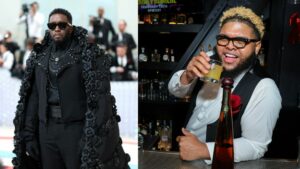The verdict arrives as part of a retrial following the overturning of his previous convictions, igniting renewed discussions on sexual violence and accountability in Hollywood.
**Harvey Weinstein Found Guilty in New York Retrial Amid Controversy**

**Harvey Weinstein Found Guilty in New York Retrial Amid Controversy**
Disgraced film mogul Harvey Weinstein faces new legal challenges after a jury found him guilty of sexual assault in New York.
Harvey Weinstein has been convicted of sexual assault in a New York retrial that has renewed conversations surrounding sexual violence and accountability within the entertainment industry. After a five-day deliberation, the jury, comprised of seven women and five men, ultimately convicted the former film mogul on one count while finding him not guilty on another, with a decision pending on a rape charge.
This retrial followed the abrupt overturning last April of Weinstein's prior sex crimes conviction, which had been declared unfair due to the judge's acceptance of testimonies unrelated to the specific charges. Following that decision, Weinstein was indicted again on fresh sexual assault allegations in September.
Witness statements from three women—Miriam Haley, Jessica Mann, and Kaja Sokola—made a significant impact in the trial, each detailing their experiences of the abuse they endured at the hands of Weinstein. The jury found Weinstein guilty of assaulting Ms. Haley, while Ms. Sokola was deemed not victimized in a separate encounter. They are yet to reach a verdict concerning Ms. Mann’s rape allegations.
In the aftermath of the ruling, Haley expressed optimism that this verdict signals a shift in attitudes toward sexual violence, suggesting “new awareness” on societal notions of victimhood is emerging. However, Weinstein's team contended that the deliberations were tainted by bias among jurors, implying that their verdicts were influenced by preconceived notions about the film producer.
The trial's proceedings were fraught with tension, with accusations of jurors clashing and even threats occurring during deliberations. Weinstein, who has health issues including cancer and diabetes, attended court in a wheelchair while being treated at Bellevue Hospital instead of jail during the trial.
Sokola discussed her journey in coming forward, claiming that testifying was a vital act of empowerment for herself and fellow survivors. Despite the guilty verdict, Weinstein still faces multiple legal battles, with over 100 women having accused him of various forms of sexual misconduct, assault, and rape. His previous California conviction results in a 16-year sentence likely leaving him incarcerated for the duration of his life.
The conviction serves to invigorate the #MeToo movement, highlighting systemic issues surrounding abuse by those in power in the industry. As Weinstein prepares for further legal challenges and strives to appeal this verdict, many hope that the outcome encourages greater accountability among powerful figures within Hollywood and beyond.
This retrial followed the abrupt overturning last April of Weinstein's prior sex crimes conviction, which had been declared unfair due to the judge's acceptance of testimonies unrelated to the specific charges. Following that decision, Weinstein was indicted again on fresh sexual assault allegations in September.
Witness statements from three women—Miriam Haley, Jessica Mann, and Kaja Sokola—made a significant impact in the trial, each detailing their experiences of the abuse they endured at the hands of Weinstein. The jury found Weinstein guilty of assaulting Ms. Haley, while Ms. Sokola was deemed not victimized in a separate encounter. They are yet to reach a verdict concerning Ms. Mann’s rape allegations.
In the aftermath of the ruling, Haley expressed optimism that this verdict signals a shift in attitudes toward sexual violence, suggesting “new awareness” on societal notions of victimhood is emerging. However, Weinstein's team contended that the deliberations were tainted by bias among jurors, implying that their verdicts were influenced by preconceived notions about the film producer.
The trial's proceedings were fraught with tension, with accusations of jurors clashing and even threats occurring during deliberations. Weinstein, who has health issues including cancer and diabetes, attended court in a wheelchair while being treated at Bellevue Hospital instead of jail during the trial.
Sokola discussed her journey in coming forward, claiming that testifying was a vital act of empowerment for herself and fellow survivors. Despite the guilty verdict, Weinstein still faces multiple legal battles, with over 100 women having accused him of various forms of sexual misconduct, assault, and rape. His previous California conviction results in a 16-year sentence likely leaving him incarcerated for the duration of his life.
The conviction serves to invigorate the #MeToo movement, highlighting systemic issues surrounding abuse by those in power in the industry. As Weinstein prepares for further legal challenges and strives to appeal this verdict, many hope that the outcome encourages greater accountability among powerful figures within Hollywood and beyond.





















